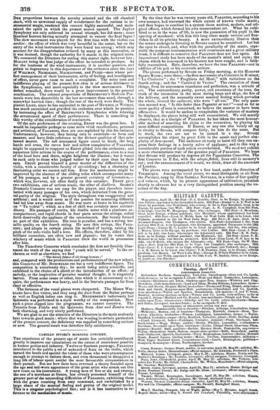cAstr.LLo srvones MORNING CONCERT.
THE experience of the present age of music has certainly contributed greatly to improve our calculations on the extent of attainment possible to human genius and industry. Twelve or fourteen years ago, PAGANINI introduced to the public a set of unheard-of feats on the violin, which turned the heads and spoiled the talent of those who were presumptuous enough to attempt to imitate them, and even threatened to disappoint a long life of labour spent amidst the most favourable circumstances in their pursuit. But see how facts have reversed a theory founded upon the age and soil-worn appearance of the great artist who struck out this new route on his instrument. A young man of five or six and twenty, the son of a merchant at Genoa, has already possessed himself of the greater part of the astounding difficulties of Peorasuru, exhibiting them with the grace resulting from easy command, and embellished by a large share of the musical feeling and genius of the original model. This is a singular psychological fact ; nor is it less instructive in re- ference to the mechanism of music. By the time that he was twenty years old, Pacasursz, according to his own account, had traversed the whole extent of known violin music; and then began to combine in a system those ancient, modern, and ori- ginal effects, which formed his own transcendent art. What he exhi- bited to us in the wane of life, is now the possession of his pupil in the opening of manhood : with him this long silent music revives and flou- rishes in all its pristine beauty. A more extraordinary illusion than the senses undergo in listening to SIVORI cannot be conceived. Let bat the eyes be closed, and, what with the peculiarity of the music, espe- cially the pompous instrumentation with trombones and a great military drum, it is difficult to conceive that PAGANINI does not live again. An impassioned study has been made of the master's mind and style ; the charm which he conveyed to his hearers has been caught, and is faith- fully transmitted. Here, therefore, we have the true Peoatustr—not in oddities of his gait or his eccentric actions. The pieces performed by SIVORI on Friday morning, at the Hanover Square Rooms, were three,—thefirst movement of a Concerto in B minor, "La Clochette" ; the " Preghiera del Mose," with variations on the fourth string ; and the " Carnival de Venise." The execution of these things, from its uncommon roundness and perfection, was a miracle of art. The extraordinary purity, power, and sweetness of the tone, the truth of the intonation in the most daring leaps and skips, the fire of the delivery, and the unusually sweet musical feeling which pervadee the whole, riveted the audience, who were "all ear." The only ques- tion mooted was, "Is this better than Paganini or not ?"—and as far as mere quality of tone is concerned, we believe the answer to have been affirmative. It would be useless to recapitulate the varieties of mastery he displayed, the pieces being still well remembered. We will merely observe, that as a disciple of PAGANINI, he has taken the most honour- able method of asserting his claim to the connexion, by playing his most difficult compositions. If ERNST, or any one else vainly set up in rivalry to Srvoar, will compete fairly, let him do the same. Bat in truth, the two are not to be named in a day. Srvonr accomplishes his object by great faith in the music and perfect sim- plicity of demeanour. The audience sit ready to burst till they can ex- press their feelings in a hearty salvo of applause • and in this way a considerable portion of each solo is overwhelmed. ire need not exhibit a more characteristic trait of the genuine pupil of PAGANINI. We hope that Srvoru will produce by degrees all the Paganinian Concertos. The first Concerto in E flat, with the adagio flebde, lives still in memory's ear ; and the announcement of it would, we think, draw all the amateurs of London.
The pieces were accompanied by a fine band, under the direction of TOLBECQUE. Among the vocal pieces, we must distinguish an air from the Paritani, sung by Miss SABILLA NOVELLO, in a voice of fine quality and volume, which, by its present appearance of cultivation, promises shortly to advance her to a very distinguished position among the vo- calists of the day.


























 Previous page
Previous page